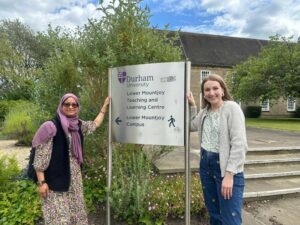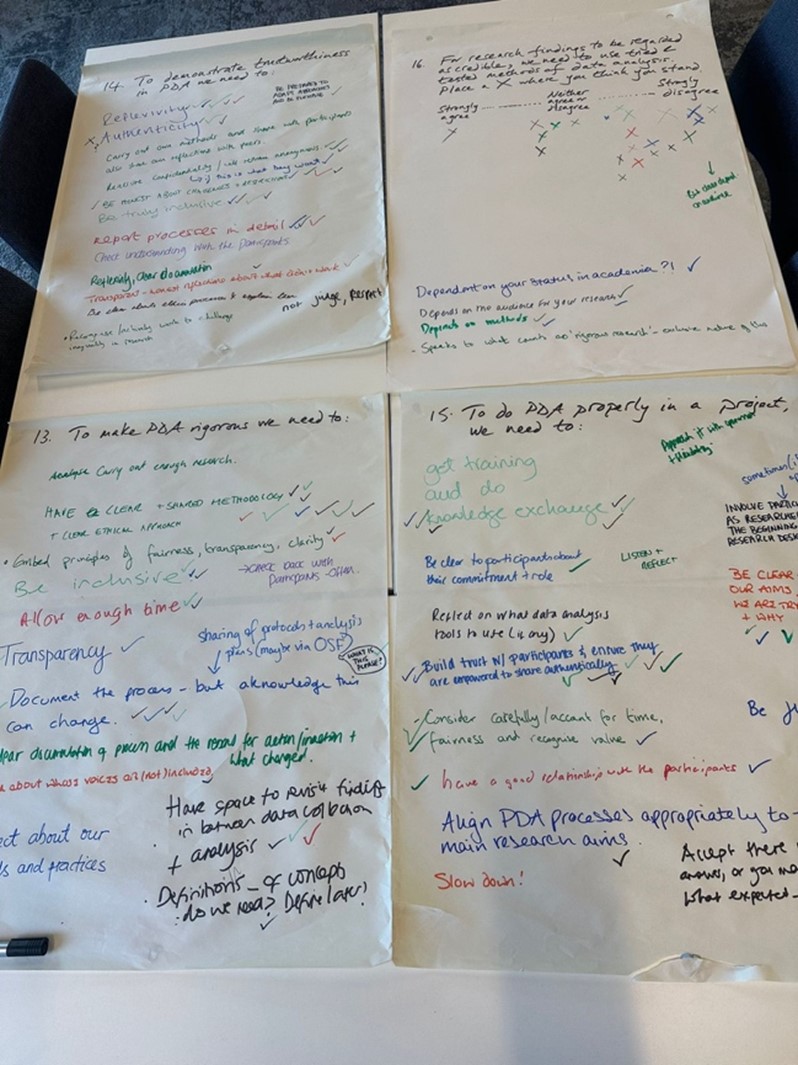Jessica Horne (Research Fellow at the University of Sussex) and Shazna Hussain (Community Researcher at the Women’s Environmental Network) report back on their time spent exploring PDA at a workshop at Durham University.
On 20th June two members of the Sussex FoodSEqual research team visited Durham University for a one-day workshop on participatory data analysis. The workshop was hosted by Durham University’s Centre for Social Justice and Community Action in collaboration with the UK Participatory Research Network, a group which embraces “the philosophy, principles, and potentials of participatory research” (UK Participatory Research Network, 2024). Three experienced researchers facilitated the event, all of whom are members of the Participatory Research Network: Professors Sarah Banks (of Durham University), Tina Cook (of Liverpool Hope University), and Jane Springett (of University of Alberta, Canada).
.
Shazna and Jessica in the grounds of Durham University’s Lower Mountjoy campus
Shazna and Jessica took the opportunity to attend so that they could explore different approaches to participatory data analysis (PDA). The workshop was free to attend and open to academics, postgraduate researchers, and members of community organisations with “experience of, or an interest in, participatory research” (Cook et al, 2024).
Shazna recalls that at the start of the workshop “we were told that ‘Participatory Data Analysis’ is always quite hard and not done enough”. We were also reminded about the “importance of staying with this approach”.
During the introduction to the workshop, Professor Sarah Banks outlined that there has not been much development in the academic literature on participatory data analysis since Melanie Nind’s (2011) article, “Participatory Data Analysis – A step too far?”. Sarah advised that there are no clear definitions of participatory data analysis, which made us curious to learn more.
We began the day with an introductory exercise which gave us a chance to get to know one another. On our table we met Dr Rashida Bibi who is a Research Associate at University of Sheffield and Sharon Bhorkar, a PhD researcher at Leeds Beckett University. There was a nice combination of researchers and practitioners in attendance at the event, all with varied experiences of undertaking participatory research.
Thinking about Participatory Data Analysis
During the first part of the workshop we were asked to participate in a Group Level Assessment (GLA). The purpose of this GLA was to help us think about different aspects of participatory data analysis individually, in small groups, and then finally as a whole group. As Shazna recalls, “around the room were 24 flipchart papers with different incomplete sentences for us to walk around and jot down our thoughts about what each one meant to us”.
Some of the starter sentences encouraged us to think about the reasons for doing PDA (e.g., working to generate shared understandings), key features of PDA (e.g., should be participatory and inclusive) and how to make PDA accessible (e.g., finding a shared language). We were prompted to consider some of the potential misunderstandings of PDA (e.g., it’s not rigorous enough) and concerns about PDA (e.g., it can be performative), as well as the disadvantages of PDA (e.g., it’s time consuming and possibly an extra burden on participants). The starter questions also brought out some of the more ‘practical considerations’ of doing PDA including time, money, and other resource considerations. Several of the sheets reflected the tensions between rigid university ethical procedures and the need to be responsive to participants’ needs, partly through reflexive collaboration and relationship building.
Once everyone had responded to the questions on the sheets individually, we were then asked to read the sheets again and put a tick next to statements we agreed with. Each table was then given four sheets to analyse thematically. We had to choose three core themes from the sheets pictured here, before sharing them with the wider group. Reflecting on the analytical steps we took to determine our themes, Shazna said that “on our table we had a little debate on what methodology meant. I thought it was the different methods that are used to research, another person mentioned feminism and a third was just telling us how we have misunderstood. Jessica was there to try and defend both sides!”.
The experience showed us some of the challenges of doing participatory data analysis, which include moving beyond personal experiences to develop a ‘higher level’ meta-analysis. As Shazna adds, “the interesting thing here was that feminist/feminism wasn’t mentioned or written down on the paper therefore the facilitators said we shouldn’t be adding information that has not been collected from research, i.e. not adding our own views/ideas/words”. We eventually settled with the following three themes:
- Transparency is needed throughout whole process.
- Importance of training for doing PDA.
- Reflexivity
“Towards Inclusive Living” – An example from practice
In the afternoon, we had the opportunity to hear about Professor Tina Cook’s experience of conducting participatory data analysis in the field of health and social care. Cook’s work explores how feelings of inclusion can shape how people with neurological impairments and their carers engage with treatment in their daily lives (see Atkin et al, 2018). During the presentation, Cook reflected on her experience of designing her research, applying for grant funding, and adapting her methods based on consultations with members of the community. She reminded us of Miranda Fricker’s concept of ‘epistemic injustice’ highlighting how PDA can involve people whose voices and experiences are overlooked in knowledge production.
Other points that stood out to Shazna include:
- The language we use as researchers is important. If we use the word ‘I’ then it is indicating, we are in control.
- The ongoing challenges are – who dictates? And funding.
Key points for Participatory Data Analysis
Towards the end of the workshop, we switched tables and were asked to reflect on two key questions for PDA which included:
- How can the values and principles for PDA enhance what can be known?
- How would you explain them to people unaccustomed to PAR and PDA?
Question 1 brought about discussion that PDA can help recognise the realities of people who have been historically overlooked. We discussed how PDA shapes different ways that knowledge can be known, challenges assumptions about who knows, and what it means to know.
We also spoke about how PDA could contribute to meaningful impact in the community. We considered the diversity of interpretation that could arise through PDA if carried out carefully and not rushed. Other key points that stood out to us include:
- PDA can help foreground community voices.
- PDA can contribute to the democratization of knowledge production.
- PDA can help explore history that is ignored.
- PDA could lead to inclusion if everyone is willing to commit to the approach.
The workshop ended with a lightening round, allowing us to reflect on our learnings as a group. Shazna reflected that “overall, the day went really well, I had a great day of learning and engaging with others”. We both enjoyed meeting researchers from different fields including (among others) social care, geography, and sociology. In Brighton and Hove, Jessica has already started to explore approaches to participatory data analysis with the community researchers. Shazna continues to play an active role in participatory data analysis in Tower Hamlets.
Other useful resources from the day
- For more information on Dr Rashida Bibi’s project on ‘Ethnicity and Unequal Ageing’ please visit: https://www.ethnicityandunequalageing.ac.uk/home
- See chapter in a book on PDA co-authored by the facilitators of the workshop: Chapter 8 – ‘Sense Making: The Process of Data Analysis and Interpretation’ In Abma, T., Banks, S., Cook, T., Dias, S., Madsen, W., Springett, J. & Wright, MT. (2019). Participatory Research for Health and Social Wellbeing. Cham: Springer International Publishing.
- Book co-authored by Professor Sarah Banks and her colleagues on co-producing research: Banks, S., Hart, A., Pahl, K., & Ward, P. (Eds.). (2018). Co-producing Research. Bristol, UK: Policy Press.
- Beacon North East. (2012). Community toolkit. A guide to working with universities. Newcastle Beacon, North East. See here: https://www.durham.ac.uk/media/durham-university/research-/research-centres/social-justice-amp-community-action-centre-for/documents/toolkits-guides-and-case-studies/Community-Toolkit.pdf
- Pain, R. Whitman, G. Milledge, D. and Lune Rivers Trust. (2012). Participatory action research toolkit: an introduction to using PAR as an approach to learning, research and action, Durham University/RELU/Lune Rivers Trust. See here: https://www.durham.ac.uk/media/durham-university/research-/research-centres/social-justice-amp-community-action-centre-for/documents/toolkits-guides-and-case-studies/Participatory-Action-Research-Toolkit.pdf
- For more information about Durham University’s Centre for Social Justice and Community Action, see here: https://www.durham.ac.uk/research/institutes-and-centres/social-justice-community-action/
References
Atkin, H., Wilcockson, J., & Cook, T. (2018). Participatory research into inclusive practice: improving services for people with long term neurological conditions. Forum Qualitative Sozialforschung/Forum: Qualitative Social Research, 19(1), p. 26.
Cook, T., Banks, S., and Springett, J. (2024). Exploring participatory data analysis: A one-day workshop. University of Durham. Available at: https://www.dur.ac.uk/media/durham-university/departments-/sociology/Participatory-data-analysis-Workshop-20-June-2024-final-SB-7.2.24.pdf
Nind, M. (2011). Participatory data analysis: a step too far? Qualitative Research, 11(4), 349-363. https://doi.org/10.1177/1468794111404310
UK Participatory Research Network. (2024). Home. Available at: https://ukprn.weebly.com


